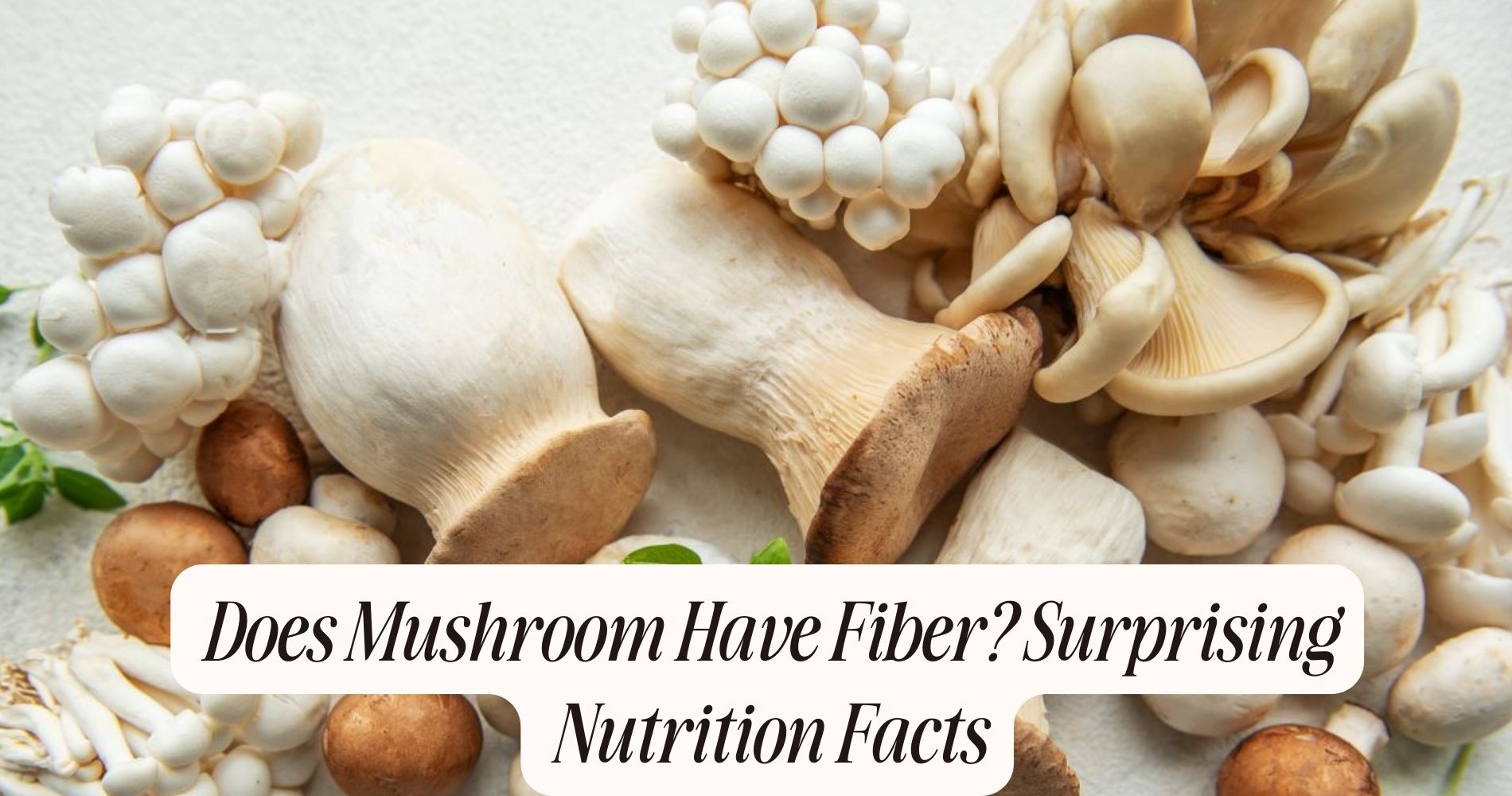
Does Mushroom Have Fiber? Surprising Nutrition Facts
Does mushroom have fiber? Mushrooms are indeed a source of dietary fiber, a component vital for digestive health and preventing constipation. Depending on the type, like shiitake or oyster, mushrooms can offer between 1 to 2.5 grams of fiber per 100 grams. This fiber primarily acts as an insoluble type, which adds bulk to meals. Beyond fiber, mushrooms are rich in essential nutrients such as B vitamins and beta-glucans, supporting immune function and overall wellness. Explore further to understand their nutritional benefits.
Understanding the Nutritional Profile of Mushrooms
When you explore the nutritional profile of mushrooms, you'll discover they're a powerhouse of essential nutrients. Different mushroom types, such as shiitake, portobello, and white button, offer varying nutritional benefits.
For instance, shiitake mushrooms are rich in copper and vitamin B5, supporting metabolic function. Portobellos provide a good source of potassium, aiding in heart health and muscle function.

Meanwhile, white button mushrooms are low in calories yet high in vitamin D, especially when exposed to sunlight. Nutritional comparisons reveal that mushrooms are generally low in fats and carbohydrates, while providing a substantial amount of protein per serving.
This makes them an excellent addition to your diet, helping meet daily requirements without excessive caloric intake.
Exploring the Fiber Content in Different Mushroom Varieties
As you examine mushrooms' nutritional profile, their fiber content stands out as another valuable component. Different mushroom varieties offer distinct fiber profiles, contributing to their unique textures.
For instance, shiitake mushrooms contain about 2.5 grams of fiber per 100 grams, providing a slightly chewy texture. Oyster mushrooms, with their delicate structure, offer around 1.7 grams of fiber per 100 grams. Button mushrooms, commonly found in salads, have approximately 1 gram of fiber per 100 grams, making them a lighter choice.
The fiber varieties in mushrooms are primarily insoluble, aiding in adding bulk to your meals. Understanding these differences can help you select mushrooms that align with your culinary needs and nutritional goals, enhancing both the flavor and health benefits of your dishes.
How Mushrooms Can Support Digestive Health
While many people enjoy mushrooms for their unique flavors and textures, they also offer notable benefits for digestive health. Mushrooms contain dietary fiber, which aids in maintaining regular bowel movements and prevents constipation. The fiber found in mushrooms can feed beneficial gut bacteria, promoting a healthy microbiome balance.
In addition, certain types of mushrooms possess compounds that may act as prebiotics, supporting the growth of these beneficial bacteria.

Moreover, mushrooms are rich in B vitamins, particularly niacin, which plays an essential role in the production of digestive enzymes. These enzymes help break down food more efficiently, ensuring ideal nutrient absorption.
The Role of Mushrooms in Strengthening the Immune System
Beyond improving digestive health, mushrooms also contribute greatly to the immune system. They contain beta-glucans, compounds known for their immune-boosting properties.
These polysaccharides enhance your body's ability to fight infections by activating immune cells like macrophages and natural killer cells. Scientific studies have shown that consuming mushrooms regularly can increase the production of cytokines, proteins that play a significant role in immune response.
Additionally, mushrooms are rich in antioxidants like ergothioneine, which protect cells from oxidative stress, further supporting immune health. Including mushrooms in your diet provides these mushroom benefits, helping your immune system function effectively.
Other Essential Nutrients Found in Mushrooms
Although commonly known for their immune-boosting properties, mushrooms are also a powerhouse of essential nutrients that contribute to overall health.
Rich in B vitamins, mushrooms support energy metabolism and enhance nutrient absorption. Vitamin D, found in certain varieties, plays a critical role in bone health and calcium regulation.
Mushrooms are also an excellent source of selenium, a crucial mineral with antioxidant properties that protect cells from oxidative damage. Additionally, they contain copper, which aids in red blood cell production and iron absorption.

The presence of potassium in mushrooms supports cardiovascular health by helping maintain normal blood pressure.
Incorporating Mushrooms Into a Balanced Diet
If you're looking to enrich your meals with nutritional benefits, consider adding mushrooms to your diet. They're a versatile ingredient, offering unique flavors and valuable nutrients.
Scientific studies highlight their low-calorie content and high fiber, which can aid in weight management and digestion. Incorporating mushroom recipes into your meals enhances your intake of antioxidants, B vitamins, and minerals like selenium.
For a balanced diet, try adding mushrooms to salads, stir-fries, or omelets. Their umami flavor complements a range of dishes, making them an excellent meat substitute in vegetarian meals.
Research suggests that regular consumption of mushrooms may support immune function and reduce inflammation. By exploring various mushroom recipes, you can enjoy these dietary benefits while diversifying your meal options.
Fuel Your Body with SUPER MUSHROOM GUMMIES
Looking for an easy way to enjoy the benefits of fiber-rich mushrooms? Well Gummies' SUPER MUSHROOM GUMMIES make it simple! Packed with 10 functional mushrooms, these convenient, chewable gummies support digestion, enhance focus, and boost immune health—all while delivering a delicious wild berry flavor. No jitters, no crash—just natural, sustained energy to keep you feeling your best. Try them today and experience the power of mushrooms in a fun, tasty way!
Frequently Asked Questions
Can Mushrooms Help With Weight Loss?
Mushrooms can assist with weight management. They're low in calories and contain fiber, promoting fullness. Including mushrooms in your diet enhances nutritional intake while supporting weight loss goals. Embrace mushroom benefits for effective, sustainable weight management.
Are There Any Potential Allergens in Mushrooms?
You could develop mushroom allergies, although they're rare. Common symptoms include skin irritation, respiratory issues, or gastrointestinal discomfort. If you suspect an allergy, consult a healthcare professional for a proper diagnosis and management plan.
How Should Mushrooms Be Stored to Maintain Freshness?
To maintain mushrooms' freshness, you'll need proper storage. Store them in a paper bag in the fridge. This allows moisture to escape, preventing spoilage. Avoid plastic bags, as they trap moisture, accelerating decomposition.
Can Mushrooms Be Eaten Raw or Do They Need to Be Cooked?
You can eat mushrooms raw, but cooking methods enhance their flavor and digestibility. Raw consumption is safe for most varieties, though cooking increases nutrient absorption and reduces potential toxins. Choose your preparation based on preference and recipe.
What Are Some Unique Culinary Uses for Mushrooms?
Explore mushroom varieties like shiitake or portobello in dishes using culinary techniques such as grilling, sautéing, or even pickling. These methods enhance flavors and textures, offering unique gastronomic experiences backed by scientific studies on taste profiles and nutritional benefits.
Conclusion
You've now discovered that mushrooms aren't just low in calories but also packed with fiber, supporting your digestive health. Different varieties offer varying fiber content, contributing to a balanced gut microbiome. Beyond fiber, mushrooms provide essential nutrients like vitamins, minerals, and antioxidants, which can bolster your immune system. By incorporating mushrooms into your diet, you're not only enhancing flavor but also fortifying your overall health with scientifically-backed benefits. Enjoy exploring the diverse world of mushrooms for ideal wellness!




